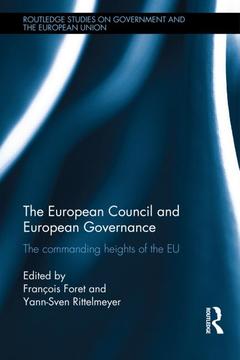Description
The European Council and European Governance
The Commanding Heights of the EU
Routledge Studies on Government and the European Union Series
Coordinators: Foret François, Rittelmeyer Yann-Sven
Language: English
Subjects for The European Council and European Governance:
Keywords
European Institutions; European integration; post-Lisbon; Policy-making; EEC Member State; Te Ch; EU’s Small Member State; EU Political System; Van Rompuy; Rotating Presidency; EU Institution; EU External Relation; Trio Presidency; Herman Van Rompuy; Commanding Heights; Semi-permanent Presidency; Rotating Council Presidency; EUCO President; Belgian Presidency; Council Presidency; Compound Representation; Nicole Notat; Reflection Group; EU’s Agenda; Rotating EUCO Presidency; National Parliaments; Common Language; Energy Policies; EU’s Economic Governance
Publication date: 11-2013
Support: Print on demand
Publication date: 10-2015
· 15.6x23.4 cm · Paperback
Description
/li>Contents
/li>Readership
/li>Biography
/li>
In recent years, the failure of the constitutional process, the difficult ratification and implementation of the Lisbon Treaty, as well as the several crises affecting Europe have revitalized the debate on the nature of the European polity and the balance of powers in Brussels. This book explains the redistribution of power in the post-Lisbon EU with a focus on the European Council.
Reform of institutions and the creation of new political functions at the top of the European Union have raised fresh questions about leadership and accountability. This book argues that the European Union exhibits a political order with hierarchies, mechanisms of domination and legitimating narratives. As such, it can be understood by analysing what happens at its summit. Taking the European Council as the nexus of European political governance, contributors consider council and rotating presidencies' co-operation, rivalry and opposition. The book combines approaches through events, processes and political structures, issues and the biographical trajectories of actors and explores how the founding compromise of European integration between sovereignty and supranationality is affected by the evolving nature of this new European political model which aims to combine cooperation and integration.
The European Council and European Governance will be of strong interest to students and scholars of European studies, political science, political sociology, public policy and international relations.
1. Introduction François Foret and Yann-Sven RittelmeyerPART I: The European Council as an institution and a policy-maker 2. The Institutional Consecration of the European Council: Symbolism beyond Formal TextsYann-Sven Rittelmeyer 3. More than a Prestigious Spokesperson – the Role of Summits and the European Council in European Political Co-operation (EPC), 1969–1981 Emmanuel Mourlon-Druol 4. EU High Politics – the Policy Agenda of the European Council, 1975–2011 Petya Alexandrova, Marcello Carammia and Arco TimmermansPART II: The EU Presidency and the European Council – complementary or competitive? 5. What's Left of the Rotating Presidency? The Future of ‘National’ PresidenciesSimone Bunse and Christopher Klein 6. The Communautarization of the Council Presidency – Intra-institutional Dimensions and Inter-institutional Effect Ana Mar Fernández Pasarín 7. The Council Presidency and the European Council – Towards Collective Leadership in the EU Steven Van Hecke and Peter BursensPART III: Legitimization of the European Union 8. An Expectation–Outcome Gap Writ Large – the Felipe González Reflection Group RevisitedLars Hoffman and Hartmut Mayer 9. Legitimacy in Numbers? Communicative Aspects of the Post-Lisbon EU François Foret 10. Problems of Compound Representation in the European Union after Lisbon Christopher Lord
François Foret is Jean Monnet professor in political science and European studies at the Université Libre de Bruxelles, Belgium.
Yann-Sven Rittelmeyer is Research Fellow in the Study Committee for Franco-German Relations (Cerfa) at the French Institute of International Relations (Ifri) in Paris, France.




